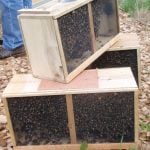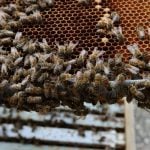
Tag Archives varroa mites

Beekeepers want financial protection against tropi mite
Tropilaelaps (tropi) mites haven’t landed in Canada; beekeepers want to know they’ll get financial help from the federal government if the deadly bee parasite ever does

Canadian beekeepers call for regulatory accountability
Some groups in the sector are frustrated with the Canadian Food Inspection Agency’s ban on U.S. packaged bees

Canadian beekeepers warn of advancing tropilaelaps mite

Deadlier than varroa, a new honey-bee parasite is spreading around the world

CFIA rejects beekeeper proposals on U.S. packaged bees
The CFIA was unconvinced that suggested measures could offset the risk of importing bee pests along with bulk bee replacement stock

A Canadian idea to save the bees
ApiSave could reduce bee death and act as a new pesticide against foulbrood and varroa mites, the company says, but it has to pass registration in Canada first.

FEATURE: Beekeepers in a corner against varroa mites
Resistance concerns are growing with chemical control products and the alternatives are finicky. What’s a beekeeper to do?

Pieces moving again on U.S. bulk bee debate
Should Canada allow U.S. packaged bees? From industry group consultations to courtrooms, the topic is heating up

Varroa mites compound bee winter losses
Beekeepers blame parasitic varroa mites, waning treatment control for bee mortality

Comment: Australia in unique position to eliminate varroa mite
The parasite is a scourge to the North American honey sector, but Down Under, the pest is still new


